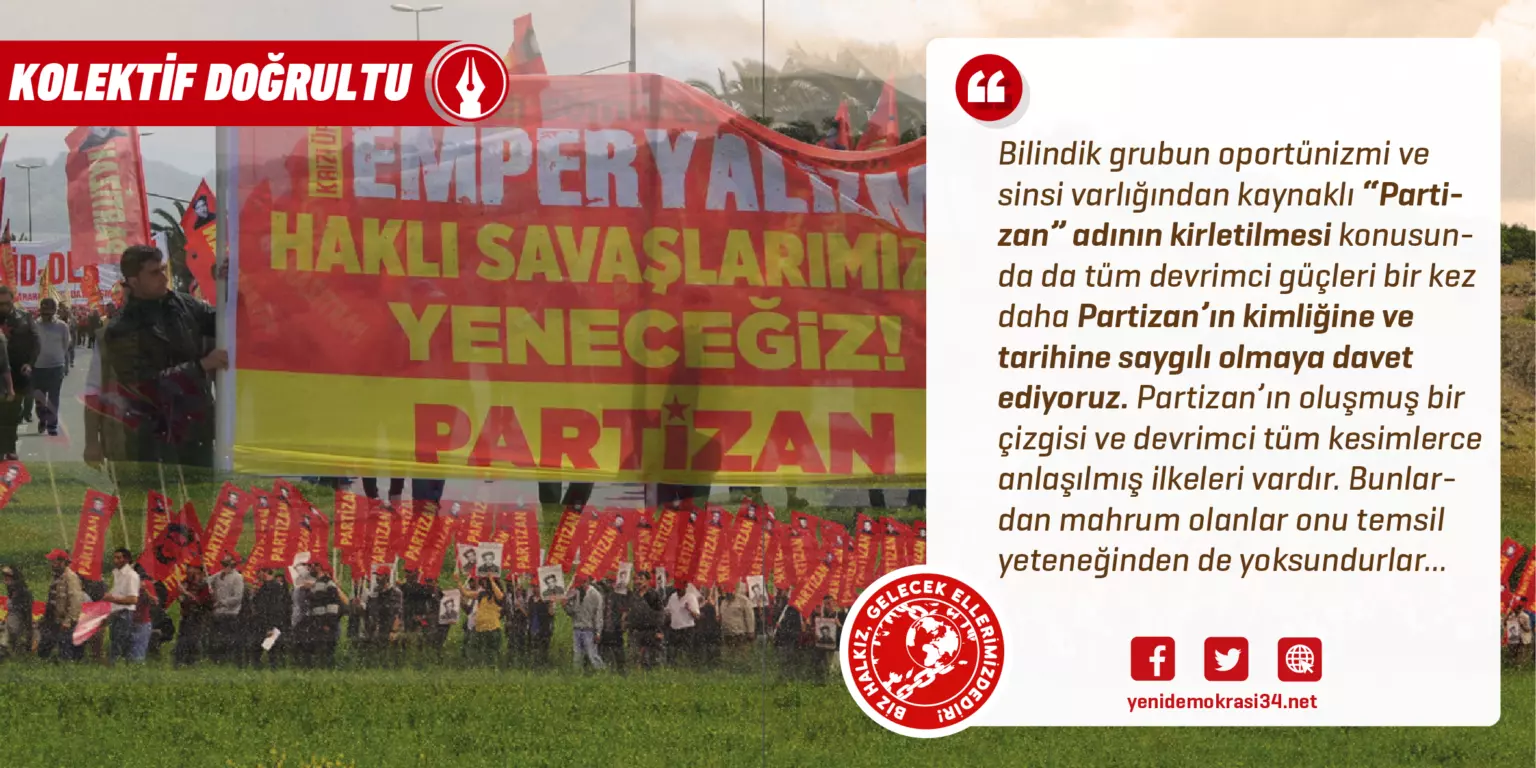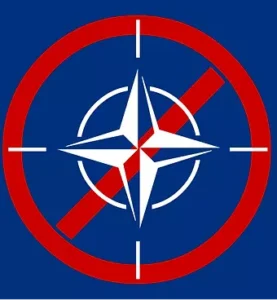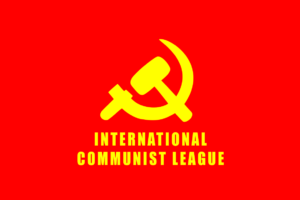
Turkey: Our Attitude in Local Elections!
We publish this unofficial translation of a declaration published on Yeni Demokrasi.
The local elections of March 31, 2024, like the previous election, are focused on the balance of power between the fascist parties representing the two cliques of the bourgeois-feudal ruling classes. The will of the sectors of the people has been suppressed to such an extent that almost every step regarding the elections is discussed in terms of the interests of these two reactionary cliques and is finally evaluated as support for one of the two cliques. This is a negative situation in terms of bringing the interests of the people to the agenda in election processes and organizing the public masses in line with these interests. It is general knowledge and discourse that election conditions are suitable for raising the awareness of the masses. Because in these conditions, almost all problems are political for the masses, and in these conditions where the level of politicization increases, the general environment is suitable for propaganda and agitation. Despite this general information, the situation is not always the same in special circumstances. If the independent movement and attitude of the proletariat does not develop, propaganda and agitation begin to be for others. Especially for opportunists and reformists, this special situation goes unnoticed or, due to their nature, it is not a problem for these segments to “serve” others. Undoubtedly, the main problem here is that the class attitude is not grasped. In elections, any policy that is far from a class perspective becomes a policy that serves the rulers…
First of all, the fact that revolutionary democratic movements put elections at the center of discussions in these times is one of the most obvious weaknesses of recent times. The election-centered discussion of the fundamental problems of the revolution essentially points to the hegemony of elections that serve the ruling classes.
As we have emphasized before, and as an opinion that we should draw particular attention to in this period, all elections, whether general or local, will strongly unite the masses with the reactionary order; The rulers use the masses as a filling material in their power struggle among themselves; To hide disorganization and condemn the people to lack of will by reducing popular administration to only electing administrators, thus facilitating ideological hegemony over the people; Let us reiterate that it serves to stifle the tendency to take action with anger and reaction against the rulers for the sake of reform.
From past to present, the revolutionary movement has evaluated the politicizing feature of election processes as a means of organizing by using legal opportunities. These processes are processes that provide important opportunities for agitation-propaganda, which is a means of organizing the people in the ranks of the revolution. Therefore, it is not possible for revolutionaries to remain indifferent to these processes. In these processes, it is almost a necessity to determine a specific policy, to determine the reflections of the general line and principles, to speak one’s own words to the politicized masses, and to explain the purpose and path. Neglecting and underestimating this ultimately means denying the role of the masses in revolutions. For the revolution, the masses must be enlightened about the revolution. The main task in the election processes is to achieve this. The important thing is to bring the consciousness of the revolution to the masses, expand the possibilities of struggle against the system and mobilize them for political power.
Communists valued elections to the extent that they included the possibility of agitation-propaganda for the revolution. There is no further expectation from the elections to see the communist influence on the masses and to develop this influence. Elections are not a way of embodying the “will of the people” as claimed in bourgeois democracy. In order for the will of the people to become concrete, the people must be organized, be aware of their interests, and have the means to realize these interests. In bourgeois democracies, these opportunities essentially belong to the bourgeoisie. As claimed, “constitutional rights” or so-called acceptances are certainly not sufficient for the existence of the possibilities in question. These opportunities are linked to being “strong”, to having control over the conditions that give rise to these opportunities, or, to put it more fundamentally, to owning the means of production and therefore the right to rule the State. Those who own the means of production also govern the State, so “democracy” is shaped as the politics under the control of this administration. For this very reason, the will of the people is not realized even in the most advanced bourgeois democracies. “Democracy” practices implemented to reveal and realize the will of the people are ultimately just “democracy games” carried out under the control of the bourgeoisie. This reality is much more clear in Turkey’s conditions. Because in Turkey, the rights of all segments of the population, especially the working class, are far behind the level reached in bourgeois democracies. In this country, even “democracy games” pose a “danger” to the rulers. We last saw this in the trustee policy applied to municipalities and associations that were strongly and indisputably considered “out of control” – and even this is an exaggerated determination.
Therefore, there is no one among the public who would even discuss the reality of the communists’ general judgment regarding the elections, let alone accept it. Almost everyone knows that elections in Turkey serve only to determine which of the ruling class cliques will govern the “national” parliament, or the municipal council in particular. Although we know that these assemblies are not likely to change the order and realize the interests of the people, the public is prevented from having the income provided by these assemblies and using the financing and various opportunities available there. This is the main feature of general or local elections…
Elections on this basis are based on deciding who will be in the administrations whose boundaries are determined by reactionary laws, in order to adhere to this order. This turns into approval of the fascist order every time. It cannot be the attitude of the revolutionary movement to decide who the masses should prefer in the ongoing struggle for the same reactionary goals between the dominant cliques. Wherever it turns into this, our basic attitude should be and will be to protest the elections and remain indifferent to this decision.
Increased Attacks
By its nature, fascist dictatorship is political force that limits democratic rights and freedoms, makes elections a mask for fascism, and does not hesitate to usurp even legally determined rights on a legal basis. It is organized from top to bottom and is completely against the organization of the people. It has a tendency to limit and weaken the possibility of public organization. In some periods of history, this tendency is realized with more intense attacks. It is obviously not a coincidence that these periods were periods when economic and social pressures on the masses increased. The revolutionary tendency in the masses makes itself felt more in these periods. This is why the concept of “survival of the State” is frequently brought up. The legs of the fascist order are too weak to support themselves. It needs a stick to carry its rotten body. This feature condemns it to an attitude that increases the dose of attacks from time to time. The reason for the intense and uninterrupted attack during this period is that conditions are getting worse, especially economically.
These negative conditions are not only experienced in the economic field. From there it spreads to other areas. The fascist parties of the system began to take steps to carry the spontaneous politicization that occurred among the masses with the local elections to the most reactionary level. It would be naive to think that only the ruling party is turning to this. It is normal for this clique to show more intense reactionism because it is in power. However, we see that the same kind of reactionism is dominant in the “opposition” parties. The candidates selected, the discussions held, the expectations created are ultimately for the survival of the State. The attitude of embracing the “Republic” is the basic attitude of each of them. The element that draws particular attention in the aggression of the ruling party is that “bourgeois democracy”, which was put forward as the basis of the republic, had to be denied under fascist rule. This republic is one of the most reactionary of the bourgeois democracies, because it is also feudal. Some regulations in the bourgeois democracies, which it takes as an example, are unsustainable for it and therefore temporary. This feature lies at the basis of the reality of coups in Turkey. This is the feature that left its mark on the last decade. Democracy was limited in every respect, and the will of the people was suppressed throughout this decade. Local elections also take place under this condition.
During the all-out attack that has continued since 2015, the bourgeois-feudal dictatorship now considers its fascist laws and even its constitution as a limiting factor. Intense reactionism, which is particularly hostile to the Kurds everywhere and in every position, acts as an aggressive force in the region including Iraq and Syria, and tries to stifle even the smallest demand for rights within the country, has turned into a stable line. For us, this is an obligation to “display the origin”. It is not a deviation from the republic, as some people think, but this is it: the State with almost no mask.
There is a policy of keeping the people’s forces within the system by ideological siege, but never allowing them to use the rights gained within the system. It also appears that this policy has been successful. Trustees were appointed to the won municipalities, even by enforcing and sometimes ignoring the provisions of the law, mayors were arrested, and legal and democratic institutions were openly arbitrarily closed or rendered inoperable. It has been a routine practice for a long time to imprison members of parliament or remove them from office for trivial reasons. As we witnessed in the removal of Can Atalay’s membership of parliament, the Constitutional Court can also be rendered ineffective when necessary. This attitude, which means not recognizing the Constitution, which is defined as the basis of the order, has once again shown what “survival of the State” is. We say it once again, because this is not the first time this has happened. In the entire history of the Republic, the Constitution was used dozens of times in the hands of the same powers as long as it was functional, and when it became dysfunctional, it was pierced, unrecognized, and shelved…
Local elections take place in such a political climate. The administrator’s stick is used with experience and open threat. Elections that do not take place in a democratic environment are organized within the established rules of the approach that the resulting will will be usurped.
The fascist dictatorship, with all its might, organizes these elections with a strong chauvinist campaign. The masses are surrounded, poisoned and shaped by political arguments such as hostility to Kurds, “monster of terrorism”, “nationality and localism”, and hostility to false imperialism. In this picture, all the reflections of chauvinism caused by the disorganization of the surrounded people also strengthen social chauvinist approaches. Social chauvinist tendencies are gaining influence among the masses opposing the AKP-MHP clique, and opposition but chauvinist parties are seen as the lesser evil in this election equation.
Political representatives of the revolutionary classes intensified their election efforts within this political climate. It must be said that in these studies, an approach based on evaluating legal possibilities and choices in order to develop and organize the people’s struggle was not essentially formed. The absence of an attitude that problematizes the political climate we are talking about shows the extent to which liquidationism and chauvinism, which have been dominant for a while, have reached. Alliance studies, candidate discussions, “tactical” approaches to eliminate the danger of trustees, “populist municipalism” arguments, etc. Ultimately, it points to a pragmatism in which the tool is the goal. This process is a period in which the doors are opened to social chauvinism and the masses are made open to this attack, open or covert “win-win” bargains are made with opposition fascist parties, and the masses are included in the game of fascist cliques, and winning and grabbing seats on a local scale is preferred to the unification of struggle forces and has become typical. Reformism was substituted for revolutionism, and worse, reformism and chauvinism were presented to the masses as revolutionism.
Reformism appears before us with a political formation that is far from understanding the political nature of the process and grasping the real problems of the people.
The main problem for the masses, who are literally trapped under hunger, poverty and fascist oppression, is how they can cope with daily life, rather than who will rule. The election and the debate about which party will emerge victorious is a debate that the rulers are trying to stir up. The expectation of the masses is never salvation. The “None” option is stronger, but the condition for this option to turn into a material power is weak. After each election, stronger economic and political attacks of the fascist dictatorship are implemented. The need of the masses is to get to the root of the contradictions, to expand their rights through independent action by deepening these contradictions, and to enter into a struggle that will challenge the rulers. Elections, on the other hand, lead to the pacification of sharpened contradictions, hinder the masses’ search for independent action and serve to deepen disorganization.
THE WILL OF THE PEOPLE AGAINST THE ELECTION GAME
In this context, directing the public to vote in general in local elections and inviting them to support them based solely on the existence of revolutionary or democratic candidates carries the danger of giving credence to vague, aimless and dangerous political approaches that emerge. We have the responsibility to warn our people against this danger, and in accordance with this responsibility, we will not participate in elections, especially in places where there is a problem of dominance and where the ruling class cliques are engaged in a fight, even if there are democratic, popular sections among them. We will remain outside the “selection” processes except in places and areas that have a certain revolutionary and democratic character and offer the opportunity to express ourselves and organize. In almost all alliances, open or covert, there is chauvinism, social chauvinism and fear of trustees. These features are also seen in election bargaining. We consider these as obstacles to a path that is correct and in line with the interests of the people and that will lead to the realization of the people’s will. Due to these features, the will of the people is suppressed, and the process of intra-systematicization is being started again, especially in the case of trustees, whom the people are very likely to develop their will. We will not be a part of this.
We once again invite all revolutionary forces to honor Partizan’s mission and history in regards to the tarnishing of the name “Partizan” due to the opportunism and insidious existence of the well-known group. Partizan has an established line and principles that are understood by all revolutionary elements. Those who are deprived of these also lack the ability to represent it…
We will act with the awareness that electoral relations and alliances that do not involve the organization and struggle of the people, bargaining based on gaining seats, and consolidating legalism by aiming at legal areas that should be tools are dangerous and lead to hindering the people’s struggle for liberation.
Crush the Election Game That Suppresses the Will of the People!
Don’t put your hope in the ballot box!
Long live the People’s Organized Struggle!
Don’t give a mandate to chauvinism and social-chauvinism!
Raise the Revolutionary Struggle!

